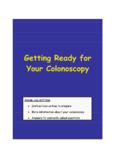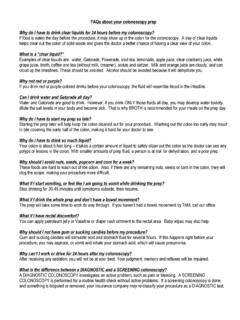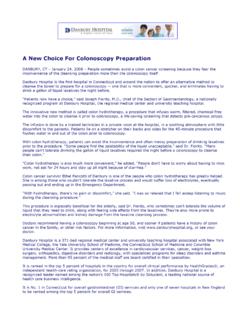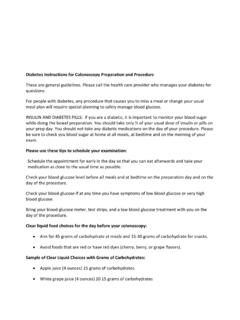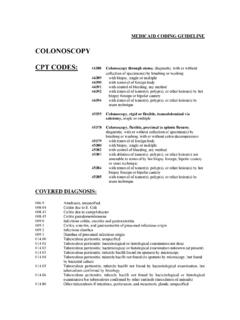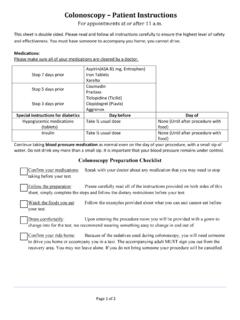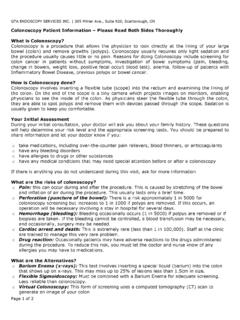Transcription of INSTRUCTIONS FOR COLONOSCOPY WITH OSMO …
1 INSTRUCTIONS FOR COLONOSCOPY with osmo -PREP. Important Please read this instruction sheet completely You have received a prescription for 32 OsmoPrep tablets. Have your prescription filled at the pharmacy. 1. STAY ON CLEAR LIQUIDS THE DAY BEFORE THE PROCEDURE. Clear liquids include juices without pulp (apple, white grape, lemonade), water, tea, plain jello (not red), soda or noncarbonated soft drinks, clear broth, or bouillon. DO NOT EAT SOLID FOODS. No milk products. 2. At 4:00 PM, take 4 OsmoPrep tablets with 8 ounces of any clear liquid. Repeat this (4 OsmoPrep tablets with 8 ounces of any clear liquid) every 15 minutes until 20 tablets have been consumed. 3. At 9:00 PM, take 4 OsmoPrep tablets every 15 minutes with at least 8 ounces of any clear liquid until the remaining 12 tablets have been consumed. 4. You are to have nothing to eat or drink (including gum and breath mints) after 12 midnight except for medications with a sip of water (please read important notices below).
2 IMPORTANT NOTICES. Please be sure that a member of your family or a friend accompanies you to and from the office to drive you home. This is necessary because of the sedation you will be given for the examination. You are not permitted to drive at any time following the procedure. You may resume driving the following day. You must have arrangements to have a friend or family member take you home after the examination. Taxis are not acceptable. Please take your heart and/or blood pressure medications with a sip of water 4 hours prior to the procedure. Please read page 2 regarding discontinuation of blood thinners. Do not take oral diabetes medication the morning of the examination. If you are diabetic taking insulin, you are instructed to contact the prescribing physician for necessary insulin dosage adjustments. IF YOU MUST CANCEL THE COLONOSCOPY , PLEASE INFORM THE OFFICE NO LATER.
3 THAN 48 HOURS PRIOR TO THE PROCEDURE. PRE-PROCEDURAL INSTRUCTIONS . MEDICATION RESTRICTIONS. 1. If you take anticoagulants, or blood thinners , please speak with your physician before stopping these medications. Anticoagulants: Aggrenox - 5 days Coumadin - 5 days Lovenox - 24 hours Plavix - 7 days Pletal - 3 days Ticlid - 14 days Trental - 7 days 2. Stop ALL ASPIRIN-CONTAINING MEDICATIONS FIVE (5) DAYS before your procedure. ** If you take aspirin for your heart or circulation, DO NOT stop it without checking with your family/heart physician. Aspirin-containing medications: Ascripton Bayer Bufferin Darvon Compound 65. Ecotrin Empirin Enteric-coated aspirin Excedrin Fiorinal Lortab ASA Momentum Norgesic Forte P-A-C. Percodan Soma Compound St. Joseph Aspirin Wygesic 3. Stop ALL NON-ASPIRIN, NON-STEROIDAL PAIN RELIEVERS THREE (3) DAYS before your procedure.
4 Non-aspirin containing medications: Advil Aleve Anaprox Ansaid Dayrpo Dolobid Feldene Ibuprofen Indocin Ketoralac Mobic Motrin Naprosyn Naproxen Relafen Trilisate Vicoprofen Voltaren 4. Stop VITAMINS AND HERBAL MEDICATIONS SEVEN (7) DAYS before your procedure. ( Ginko-Biloba, Garlic, St. Johns Wart, Vitamin E, Multi-Vitamins, One-A-Day, Centrum). 5. There are NO RESTRICTIONS on the following pain medications: Acetaminophen (Tylenol) containing products (Tylenol, Darvocet, etc.), as well as: Avinza Baclofen Bextra Celebrex Darvocet Duragesic Patches Elavil Excedrin-Aspirin Free Fioricet Flexeril Kadian Lorcet Lortab Methadone MS Contin MSIR. Neurontin Oxy IR Oxycontin Pamelor Panadol Percocet Percogesic Trileptal Ultracet Ultram Valium Vicoden Zanaflex Zonegram If you have any questions, please call our office about your medications. What is a COLONOSCOPY ?
5 COLONOSCOPY is a procedure that enables your physician to examine the lining of the colon (large bowel) for abnormalities by inserting a flexible tube that is about the thickness of your finger into the anus and advancing it slowly into the rectum and colon. What preparation is required? The colon must be completely clean for the procedure to be accurate and complete. Your physician will give you detailed INSTRUCTIONS regarding the dietary restrictions to be followed and the cleansing routine to be used. Follow your doctor's INSTRUCTIONS carefully. If you do not, the procedure may have to be canceled and repeated later. What can be expected during a COLONOSCOPY ? COLONOSCOPY is usually well tolerated. There is often a feeling of pressure, bloating or cramping at times during the procedure. Your doctor may give you medication through a vein to help you relax and better tolerate any discomfort from the procedure.
6 You will be lying on your side or on your back while the colonoscope is advanced slowly through the large intestine. As the colonoscope is slowly withdrawn, the lining is again carefully examined. The procedure usually takes 15-60 minutes. In some cases, passage of the colonoscope through the entire colon to its junction with the small intestine cannot be achieved. The physician will decide if the limited examination is sufficient or if other examinations are necessary. What if the COLONOSCOPY shows something abnormal? If your doctor thinks an area of the bowel needs to be evaluated in greater detail, a forceps instrument is passed through the colonoscope to obtain a biopsy (a sample of the colon lining). This specimen is submitted to the pathology laboratory for analysis. If polyps are found, they are generally removed. None of these additional procedures typically produce pain.
7 Remember, biopsies are taken for many reasons and do not necessarily mean that cancer is present. What are polyps and why are they removed? Polyps are abnormal growths from the lining of the colon which vary in size from a tiny dot to several inches. The majority of polyps are benign (noncancerous), but the doctor cannot always tell a benign from a malignant (cancerous) polyp by its outer appearance alone. For this reason, removed polyps are sent for tissue analysis. Removal of colon polyps is an important means of preventing colorectal cancer. Tiny polyps may be totally destroyed by fulguration (burning), but larger polyps are removed by a technique called snare polypectomy. The doctor passes a wire loop (snare) through the colonoscope and severs the attachment of the polyp from the intestinal wall by means of an electrical current. You should feel no pain during the polypectomy.
8 There is a small risk that removing a polyp will cause bleeding or result in a burn to the wall of the colon which could require emergency surgery. What happens after a COLONOSCOPY ? After a COLONOSCOPY , your physician will explain the results to you. If you have been given medications during the procedure, someone must accompany you home from the procedure because of the sedation used during the examination. Even if you feel alert after the procedure, your judgment and reflexes may be impaired by the sedation for the rest of the day making it unsafe for you to drive or operate any machinery. You may have some cramping or bloating because of the air introduced into the colon during the examination. This should disappear quickly with passage of flatus (gas). Generally, you should be able to eat after leaving the COLONOSCOPY , but your doctor may restrict your diet and activities, especially after polypectomy.
9 What are the possible complications of a COLONOSCOPY ? COLONOSCOPY and polypectomy are generally safe when performed by physicians who have been specially trained and are experienced in these endoscopic procedures. One possible complication is a perforation or tear through the bowel wall that could require surgery. Bleeding may occur from the site of biopsy or polypectomy. It is usually minor and stops on its own or can be controlled through the colonoscope. Bleeding can occur several days after a polypectomy. Rarely, blood transfusions or surgery may be required. Other potential risks include a reaction to the sedatives used and complications from heart or lung disease. Localized irritation of the vein where medications were injected may rarely cause a tender lump lasting for several weeks, but this will go away eventually. Applying hot packs or hot moist towels may help relieve discomfort.
10 Although complications after COLONOSCOPY are uncommon, it is important for you to recognize early signs of any possible complication. Contact your physician who performed the COLONOSCOPY if you notice any of the following symptoms: severe abdominal pain, fever and chills or rectal bleeding of more than one-half cup. How accurate is COLONOSCOPY ? COLONOSCOPY is an accurate method to detect colon cancer and polyps but is not perfect. There may be up to a 10% miss rate for detecting polyps or other growths. It is also important to know that a COLONOSCOPY screening program can reduce, but not eliminate, the risk of developing colon cancer.
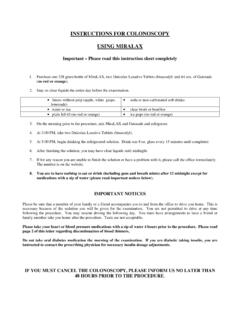
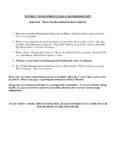
![LIBERAL BLAND DIET II 6[1].29.06 - Gastroenterology Group](/cache/preview/6/5/2/8/e/d/1/d/thumb-6528ed1dfc1a99fdd566db67dc3ed846.jpg)
